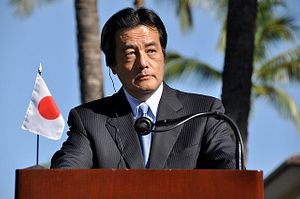Acting party leader Katsuya Okada was elected president of the Democratic Party of Japan (DPJ) in an intraparty election last Sunday. Though former party Secretary-General Goshi Hosono won more points than Okada during the first round, Okada won the runoff by pulling support from former Welfare Minister Akira Nagatsuma’s backers. Okada’s victory reflects an affirmation by DPJ members of the party’s “mainstream.”
In Japanese politics, being “mainstream” means being able to balance and harmonize the interests of the extremes. Anticipating a runoff after Nagatsuma’s elimination, Okada assiduously sought support from this group, leading one House of Councillors member to comment, “Mr. Okada seemed to have given a great deal of consideration to party members who are backed by labor unions and hold liberal political views.” The night before the election, Okada met with former House of Representatives Vice Speaker Hirotaka Akamatsu and agreed to appoint Nagatsuma and Shoichi Kondo to senior party posts if elected. In a speech before the runoff, Okada praised Nagatsuma’s policies multiple times, and Okada’s aides were calling Nagatsuma’s supporters until the very last minute.
Given his deliberate outreach during the election, Okada will likely have to take in the views of the DPJ’s left wing in creating future policy. This could have interesting security implications as, for example, Okada courted former members of the Japan Socialist Party who oppose amending the constitution.
Sunday’s race was not only about who would run the DPJ in the future, but about the nature of Japan’s opposition as a whole. Though the DPJ is the largest opposition party in Japan, it has been unable to pose a serious challenge to the ruling Liberal Democratic Party (LDP) of Japan since it left power in disarray at the end of 2012. Hosono had floated the idea of merging the DPJ with the conservative Japan Innovation Party, and he could have made the DPJ responsible for the reorganizing the entire opposition camp. But Hosono’s bold vision and emphasis on “breaking with the past” ended up being his undoing, as older members of the party frowned on his rejection of their past accomplishments.
Instead, following Okada’s path, the DPJ will focus on rebuilding itself from within by succoring party cohesion and unity. This is reflected in Okada’s choice for top party posts: while retaining Yukio Edano as secretary-general, he appointed former rivals Nagatsuma and Hosono to the position of deputy president and policy chief, respectively. Okada’s goal is to “make executive appointments appropriately with a wholesome DPJ in mind.”
Despite a poor showing at the polls last December, there is growing support in the Japanese public for a DPJ comeback. In 2012, only 53 per cent of respondents in an Asahi poll wanted a DPJ challenge to the LDP, and in 2013 the number dipped even lower to 43 per cent. However, a poll this weekend found that the number had moved up significantly to 61 per cent. Whether voters agree with Abe’s policies or not, it seems that more Japanese are willing to look beyond the failures of the first DPJ government if it means that a credible opposition can force the LDP into open, honest debate, as befits a democracy.
Okada’s term will last until September 2017. The success of his term will be judged on the basis of how he rebuilds the DPJ from within. Looking forward to policy debates in the next few months, keep an eye out for how the party deals with security-related issues, such as collective self-defense and the role of the Japanese military overseas. Okada will have to create an acceptable consensus within the party and also navigate opposition to the LDP while presenting an alternative vision for Japan’s security.

































